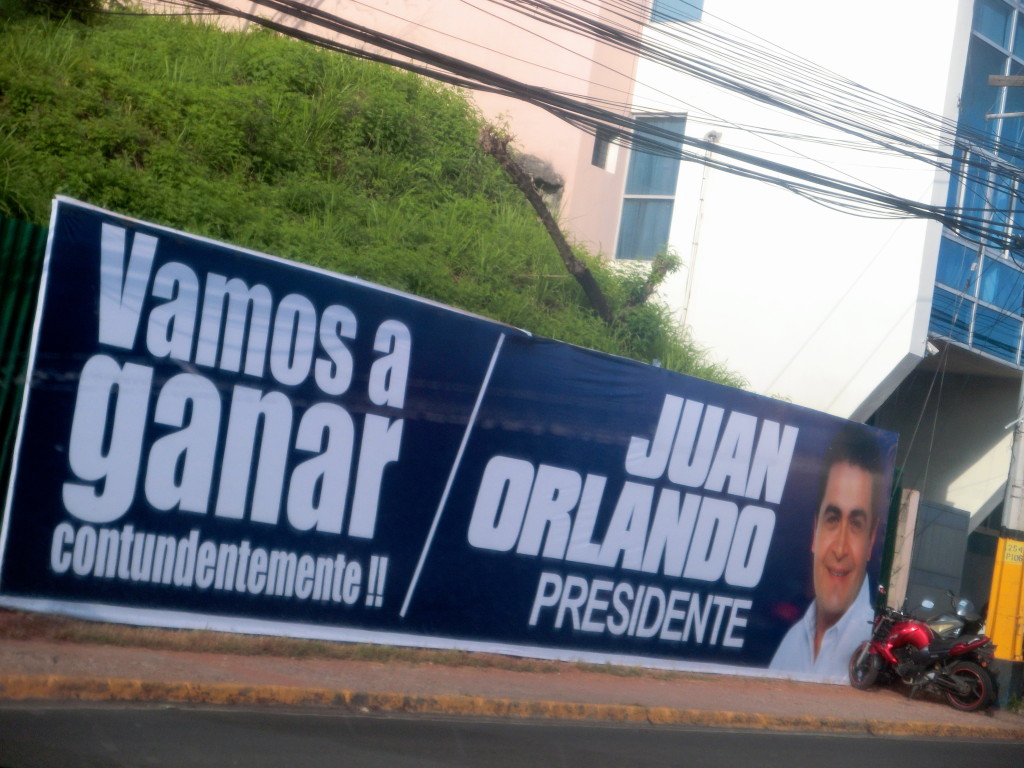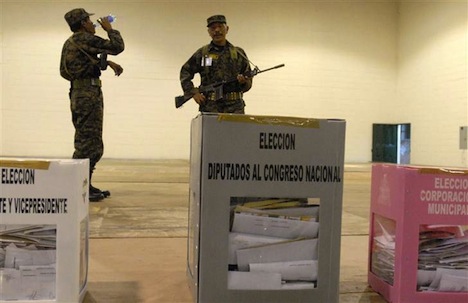Good morning from Jerusalem, where it’s 5 a.m. Monday morning.![]()
1:17 am — On Facebook, some activity from both Hernández and Villeda.
Hernández is thanking Villeda for a telephone call congratulating him for his victory; Villeda is thanking his supporters for two years of support, in what amounts to something of a concession (though Villeda doesn’t actually concede in the post).
* * * * *
12:39 am — With 54% of the results reported from the TSE, Hernández retains a 90,000-vote lead:
Hernández now leads with 556,333 votes (34.27%), followed by Castro de Zelaya with 466,537 votes (28.67%), Villeda with 339,919 (20.94%) and Nasralla in fourth with 251,224 (15.47%).
Vásquez has fallen back — he’s still in fifth place, but just barely and with hardly any material support with 3,339 votes (0.21%).
To recap, however, both Hernández and Castro de Zelaya have declared victory, Nasralla has alleged TSE fraud, and there’s not exactly a lot of public trust in Honduran public institutions, so don’t expect this to end anytime tonight.
* * * * *
12:17 am — The fourth candidate in the race, Villeda, is obviously not declaring victory, but neither is he alleging fraud. In character, he’s cautioning patience on Twitter and awaiting more communications from the TSE.
* * * * *
12:08 am — Nasralla is now calling the vote’s integrity into dispute, arguing that 25% of tallies from the TSE ‘have different totals than when transmitted to parties’ according to Honduras Culture and Politics, per Twitter. Nasralla has now called the results fraudulent — remember that though Nasralla’s the fourth-place candidate, he pulls a lot of support from relatively conservatives voters who might otherwise support Hernández.
It seems increasingly likely that this won’t be sorted out tonight, even if the TSE reports more than the 43% of provisional results that it’s already announced.
* * * * *
11:21 pm — One reason why I’m not quite convinced that fraud won’t be an issue is that there’s been a fair amount of intimidation against certain parts of the electorate throughout the campaign, especially LIBRE activists and candidates. As La Prensa reported earlier and the Center for Economic and Policy Research notes, two LIBRE candidates were assassinated late Saturday outside the Honduran capital of Tegucigalpa:
Yesterday, Saturday two leaders of the Libre party were assassinated after leaving a party meeting in the community of Carbón in the municipality of Canta Rana, department of Francisco Morazán.
The incident occurred at 8:50 pm. Braulio Almendares, general secretary of the National Agricultural Workers Central PNPP, denounced, on Globo TV, that the leaders were ambushed by two individuals wearing ski masks and heavily armed.
The now deceased individuals are the Hondurans Julio Ramón Araujo Maradiaga (67) and María Amparo Pineda Duarte (52), who is a leader of the campesino cooperative group Carbón. “The woman had already received death threats which leads us to believe that the crime had a dual meaning”, said the complainant. Wilmar Alexander Solórzano, son of María Ampara, assures that she and her family have enemies and that they don’t know where the killing comes from.
While it doesn’t mean that Hernández’s lead, if it holds up, is fraudulent, the vast campaign of intimidation against LIBRE and the Honduras left (among others, including journalists) certainly means that an eventual victory for Hernández will always be tainted with unfairness. That’s especially troubling in light of the human rights abuses that have increased with greater impunity since the June 2009 coup.
If Hernández does win with a 5% or 6% margin over Castro de Zelaya, it may well be that he could have won the election, even in conditions more openly ‘free and fair’ than the current conditions.
* * * * *
10:59 pm — No word yet on which party will win the National Congress, and by what margin. That’s almost as important as the presidential election. If Hernández does win the election with around 32% or 34% of the vote, he’ll do so with the smallest mandate since the return of regular democratic elections to Honduras since 1981 (though that outcome has been almost a certainty since the summer, if not earlier). There’s no guarantee that the National Party will win a majority in the 128-member congress, especially given the open-list proportional representation system, so Hernández will likely have to find a way to form an alliance.
* * * * *
10:54 pm — Now Hernández is declaring victory, and promising, once again, ‘Voy a hacer lo que tenga que hacer para devolver la paz y la tranquilidad en Honduras,’ or ‘I’ll do whatever it takes to return peace and tranquility to Honduras.’ His military police force has been at the center of the National Party’s campaign. Continue reading LIVE BLOG — Honduras election results coming in: both Juan Orlando, Xiomara declare victory

